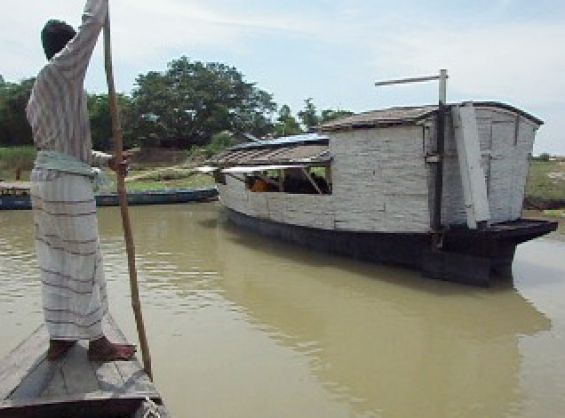Building a secure future in Bangladesh

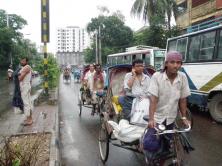
Bangladesh is the most crowded place on Earth and will become even more impossibly packed in the next 30 years.
Approximately 20% of its land, it is feared, will be lost to the rising waters brought about by climate change.
Today's 150 million Bangladeshis also have to face cyclones and arsenic-contaminated water. About half of the population is illiterate and a third live on less than one US dollar a day.
While others make plans for overpopulation, global warming mitigation and sustainable development, in Bangladesh, it is time for action. And the leadership is coming from within.
BBC presenter Paul Rose has travelled to Bangladesh to meet Nobel Peace Prize winner Muhammad Yunus, the pioneer of micro-credit and visionary of hope for the world's poor.
He will also visit villages, field projects, and schools; and talk to the country's leading innovators to report on life at the "front line of sustainable development".

DAY 5: PROBLEM-SOLVING BANGLA STYLE
How many bankers do you know that have a fan club? As I left the hotel a group of young student interns on a micro-finance pilgrimage were a bit awestruck that I was about to meet the head of a bank.
"I see you are on your third bottle of water already," laughed Professor Muhammad Yunus as he warmly greeted me.

Paul Rose and Muhammad Yunus |
We had last met at the Royal Geographical Society in London and where I no doubt looked smarter than my rain and sweat-soaked self did now, having had only just made it in time for his 69th Birthday celebrations and the opening of the Yunus Centre.
Yunus invented micro-finance in 1976 after seeing how loan sharks were effectively running poor people's lives.
By 1983 he had started Grameen Bank; in 2006 he received the Nobel Peace Prize and started the path to one of his life's dreams: the end of poverty.
With his innovative approach and leadership of the burgeoning micro-credit movement and with social business models running worldwide, he even talks seriously about a Poverty Museum.
Different ways
It was obvious that the opening of the Yunus Centre meant a lot to him.
He has received prestigious awards and accolades worldwide, but here he was on home turf, at his own bank, with his wife, about 40 of his close friends and business colleagues to open the new centre.
His opening speech was all in Bangla, which added to the friendly, almost intimate feeling. People laughed and the whole atmosphere was relaxed and celebratory.
He did give a summary of the speech in English afterwards and continuing in English he said that his daughter had recently got married and would we like to see the slideshow? Of course we did. We even sang "Happy Birthday" when the cake was produced afterwards.
Later, I sat next to him in a smaller meeting. We all discussed microfinance, future capitalism and social business issues. But I was left in no doubt that he is a serious man of action who loves the practical activities that are his mission to end poverty. Even better, as he advises, one must "do it with joy".
That to me is all anyone needs to know about Muhammad Yunus: he is a banker with a global fan club, shows family wedding pictures at official bank events, is fun to be around and has an unwavering drive to succeed.

This is an extremely busy part of the world
A few metres from the entrance of Grameen Bank headquarters, it's back to the assault of senses that is Dhaka.
I have only been here a few days, but already I hardly notice people peeing and defecating in the open sewer just outside the bank. There is so much traffic that the city should really be permanently grid-locked, but it all moves somehow and I am now convinced it must be the combined power of all the car horns.
There are about 600,000 rickshaws in Dhaka. One of the young riders let me have a go and as a keen cyclist I thought it would be easy, but it felt like the worst bicycle I had ever ridden. No gears, heavy, hard to steer. I was happy to turn it back to him for the rest of his 10-hour shift even though it was empty when I rode it and he can carry 500kg.
There are five million working children in Bangladesh. But because of the level of poverty, there is no choice. If they didn't work, they and their families would not survive.
Many of them work in legal textile factories and if they were forced out of those factories they would have to take work in dangerous unregulated factories, or be reduced to join the beggars that I am looking at right now.
But unlike beggars in many other cities, the Dhaka beggars are gentle and friendly. It's impossible not to give some money to children, or women with children and the terribly disabled man who chased me for 50m along the road crawling and rolling sideways.
However, when I had had enough and didn't hand over money to the next set of beggars, they would still smile, shake my hand, ask me where I was from and wave goodbye.
'Super-adapters'
I have even started to believe the story about Bangaldeshis being some of the happiest people in the world. At first glance, it makes no sense at all, but I can say that these people smile most of the time; they are easy to be with and pass on a sense of happiness that seems totally at odds with their situation.
We change when we absolutely have to. And here in Bangladesh where the forces that make change are so immediate and the options can be so limited, they have become masters of adaptation and innovation.
The pollution levels in Dhaka reached crisis levels. So all vehicles are now running on LPG. When you see all that traffic, it's easy to brace yourself for foul exhaust gases, but the traffic jam air is remarkably clean.
Population growth was out of control in the 1980s and through education they have now brought the growth rate down to just 2%. A new government target for 2010 is a growth rate of just 1%.
Bangladesh is at the front line of climate change and even though this country has added very little to the mechanisms that are causing global warming, they are the ones that have to deal with its effects right now.
Micro-credit and social business models invented here are being applied globally in developed and developing countries.
Those of us not living in a developing nation have an opportunity to learn from these friendly, hard-working super-adapters. The examples of leadership and innovation they have set here at the front line are all that's needed to galvanise us all in action towards sensible decisions about our out-of-control global population growth rate and our effects on the world's climate and ecosystems.
And if we do it by applying the "Bangla Method", we can do as Muhammad Yunus says and "do it with joy".
DAY 4: THE FUTURE WORLD LEADERS
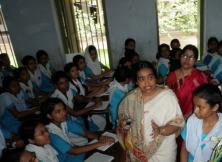
A school that handles its 2,000 pupils on a two-shift system
"One of our poets said that the monsoon rain was like watching girls dancing," said Nuha Pabony, one of my young hosts at the Rajshahi School.
I thought back to my journey here; flat rice fields had stretched to the horizon, the view only broken by low mud irrigation walls and channels and a young boy pedalling a stationary bike.
Not the same smooth machine that you and me might use in the gym, but a bike connected to a water pump and it looked like hard work at 40C.
There is not only too much water in Bangladesh from rising sea levels, but there is also too little. Bangladesh's already stormy climate has become unpredictable and even stormier.
So the once reliable monsoon waters that filled this river and flowed easily across the rice fields through carefully maintained channels, have once again not arrived.
Four hours on the road and I saw one big diesel water pump, a lot of boys on bicycle pumps and some farmers scooping water in small pans from one level to the next to bring water up the three meters to the fields.
Model pupils
In the packed school office as I ate great fresh mango, cake, sweets and countless cups of sweet tea, Nuha and some of her fellow students were bursting to show me around their school.
At the same time the headmistress and her team were enthusiastically describing the way the school handles its 2,000 pupils on a two-shift system, the academic successes and the love they have for all of the pupils.
I was taken aback by the response from Nehu: "We love our headmistress too and all of our teachers. Some of us will be teenagers soon and will face some challenges, but we know that she will help us through any difficulties."
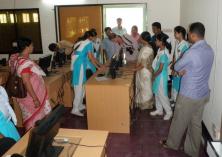
The pupils' enthusiasm was evident at every turn
At that, we were off at a good pace through the school. First stop was a classroom full of models. To help bring history, geology, geography and culture alive and also make it more memorable, the pupils make clay models.
In the corner was Mount Everest, the Himalaya and foothills complete with rivers showing the flora and fauna changes in the lowlands. Next was an anthropological study.
Then came a volcano in which candles burned at the top. Some models showed old and modern history, all of them were bright and looked like fun to make.
Another model showed the freedom of Bangladesh from Pakistan in 1971, and included prone figures half-painted red, representing the loss of three million Bangladeshis.
Science classes
We burst out briefly into the sun, then dashed into another room and a mathematics class.
"How is the lesson going?" I asked. "It is going very well, thank you!" said 20 pupils in perfect English. Out in the sun, into the Biology Lab and an excited group explained how they were measuring the CO2 uptake of plants; others had preserved fish in jars.
I took a quick glance at the blackboard full of science diagrams and the beautiful pupil-made pictures on the walls and was off again.
This time it was upstairs and into the two computer labs. They take their computers seriously here and I couldn't help but think about how these talented, energetic and loved youngsters will bloom even more now that they have improved internet access.
Only one-sixth of the 6.5 billion of us have access to the internet and we will be realising huge talents as the developing nations get online.
As I walked back across the courtyard and towards the three-metre-high perimeter wall, Nuha told me about the links the school has with a school in Swansea, UK.
There is a lot of excitement about a group of Swansea pupils coming to stay this autumn and clearly it's a first class learning opportunity but it will also be great fun!
I had trouble leaving the school. Not only because I wanted to stay and see more, but also because the second shift of the other thousand pupils were coming in through the just-opened solid-metal gates as I left.
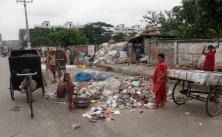
"Big differences between those with an education and those without"
Five sweaty hours on the road later I took a walk in the streets here in Dhaka and came across an area where the children sort rubbish on the street. One little girl was blowing up a balloon and I went for the camera.
But I failed to take the picture when I realised she was blowing up a used condom.
Almost half of the population here is illiterate and there are some awfully big differences between those with an education and those without.
Days 2 & 3: THE ARMADA IS HERE
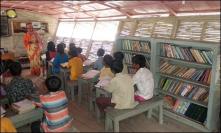
Heads down and study hard on the school boat
"With these 54 boats, we support 90,000 families," said Abul Hasanat Mohammed Rezwan. "How many people are left to reach?" was my obvious question. "20 million".
I think he might just do it, too; partly because Rezwan, a Bangladeshi architect-turned-boat-builder, has had such great success already, and partly because there is no other choice.
This is the "front line of climate change" and people have to adapt.
The effect of sea level rise and more unstable weather patterns mean that 20% of the country is going under water in the next 30 years. One of the many striking things about being on the river is that it's blindingly obvious that it's happening now - the forecast water level rise is not just a theory.
I wanted the clatter of the engine to stop so I could soak up the peaceful river-bank life. Women were beating clothes clean, men were meticulously washing cattle and while boys were leaping about and swimming, old men stood neck deep and watched us pass.
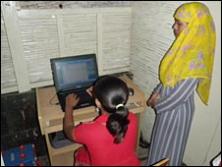
This is a connected age
Rezwan continued: "These people can't travel for health care and education so the boats bring it to them."
We pulled alongside a school boat and the noise of the engine was replaced by children chanting responses to a teacher. The 30 children were in the middle of a class and totally focussed on their books, the teacher and blackboard.
It was easy to get caught up in the rhythm, smiles and enthusiasm of the class. There is a sense of dedication from the teachers and a matching level of respect from the children.
Obviously proud, Rezwan pointed out the solar-powered computer system - the roof mounted panels feed a set of batteries and via an inverter they power the computers. I checked the web connection and loaded the BBC News website in a few moments.
For every need
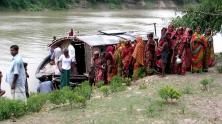
Women queue patiently for an appointment on a Bangladeshi health boat
Further up river, we came alongside a healthcare boat. And this time, the engine noise was replaced by silence.
About 40 women were queuing down the steep muddy bank, some holding children, older women looking tiny and resilient, young boys hanging around.
The only sound was of a softly spoken consultation onboard. The doctor quickly invited me in and told me that this woman had high blood pressure and a lack of energy; and as he prescribed the drugs, the patient moved to the prescription table, was issued the pills and her medical records updated.
Without any delay the next patient was onboard and with the doctor. Free healthcare delivered to a remote village - I didn't need to understand any Bangla to see what it meant to these people.
Rezwan explained the boats are built locally, some have engines and others are towed. All of them have solar power systems and his design without central supports and careful use of local materials ensures that the workspaces are maximised.
Sun power
This was especially clear at the next boat which was the two-storey library boat. The lower deck had bookshelves along each side, a circular study table also designed by Rezwan and the computer system at the forward end.
The top deck was an airy study area and more stacked bookshelves. I asked a teenaged reader what she thought of the library. Rezwan translated: "I love to study here and take books home."
I then asked if she read for fun as well as school studies. She laughed: "I enjoy the books for their knowledge!" Along with her friends she laughed even more with embarrassment when she mistakenly shook my offered hand as I left.
I totally forgot that in these remote and traditional communities men and women do not get that close in public.
I was on safer cultural ground on the next boat as it was the technical support boat and even I couldn't make social gaffs with solar power, batteries and solar lights.
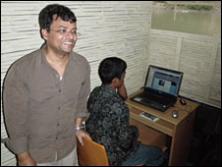
Rezwan: We're bringing services to the people
Rezwan's non-profit organisation, Shidhulai, also provides these solar lights free of charge. I was happy that the technician took only a quick break from his soldering to show me the charging system and solar units, as he had people waiting to swap their flat batteries for charged ones.
Farming tips
It's easy to see how essential this free service has become - these simple solar units are the only light source available.
As we motored further upriver to visit an education boat, Rezwan confidently outlined Shidhulai's climate change adaptation plans: "We'll have to live on the water in floating communities, including floating gardens and farms. In the south, we had floating gardens 400 years ago, so it's nothing new. We'll scale up the system and make it work."
The video conferencing session onboard the education boat was linking an agricultural scientist here at the front of the boat with a distant farmer.
Projected onto the screen for the 40 farmers was both sides of the video call and a display of a pest's life cycle and instructions on killing it without using commercial pesticides.
The two experts were sharing their knowledge and ensuring that the farmers got the information at the same time. Soaking up the very positive and engaging feeling onboard I realised that if anyone can make floating farm communities work, then it was Rezwan combined with that clear determination of the Bangladeshis.
It just has to work. 20 million Bangladeshi climate refugees will be counting on it.

School boat
DAY ONE: SO MUCH WATER, BUT NOT ALWAYS THE RIGHT STUFF
"We must do everything we can to provide enough safe water for every Bangladeshi," says a representative of the environmental services firm, Veolia.
"Climate change has meant that our monsoon is no longer reliable and we are desperately short of water."
In the small village of Goalmari, about a hundred local people gathered to celebrate the opening of the first arsenic water decontamination plant built by Veolia.
It is the result of another successful partnership between Grameen Bank and big business. Professor Yunus set up Grameen Bank in the 1970s to provide financial services for the rural poor.
On the stage, Muhammad Yunus, Grameen Bank officials and local dignitaries all agreed enthusiastically with the opening remarks.
But at the exact moment we all applauded, the heavens opened with the mother of all thunderstorms.
The noise of the heavy rain on the tarpaulins overhead made it almost impossible to hear the presentations. When the fabric began to sag and leak there was a scramble to cover those on stage with umbrellas.
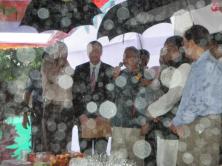
So much rain that it almost flooded the camera
We all moved around to the dry spots, and young lads pushed up on the sags with long poles and drained the water to the sides. Then then the music started.
Girls danced on stage, everyone bopped to the music, while rain poured in through every seam.
There were no dry places now so we took photographs of our wet selves and had lovely laughing conversations with the villagers.
It didn't matter that I speak no Bangla or that their English was limited; we were having a great time.
And the event was worthy of a celebration; The Grameen and Veolia partnership means that these people will now have clean water to drink.
Throughout their lives so far, the only water that has been available to them was contaminated with arsenic.
Traditionally, people here have used rivers and ponds for drinking water. But by the 1970s, the lack of sanitation and water-borne disease was killing an estimated 250,000 children each year.
The solution seemed simple: Tube wells for every village. Millions of wells were sunk and the unlimited cool water and reduction in the child death rate seemed evidence of success.
But no-one had checked to see if the ground water was safe; in fact it contains large amounts of naturally-occurring arsenic.
It took over 20 years before testing of the well water over the border in West Bengal showed that it was contaminated, and that it was poisoning large numbers of people.
Early symptoms of arsenic poisoning include skin blisters and dark blotches. This is followed by internal organ damage and arsenic-induced cancers.
Solving this crisis is a huge task. It will take longer to test all of the tube wells than it took to drill them.
It will take longer still to set up decontamination plants. And even longer than that to communicate the problem to the millions of people who remember the well water as something marvellous that saved them from the surface water diseases.
In the meantime, over 50 million people are still drinking water that is poisoning them.
So we really did have something to celebrate at Goalmari. The innovative partnership of Grameen and Veolia started to save lives from the first batch of clean water.
The music stopped, the final messages of congratulations were sent from those on stage; and the rain stopped immediately. Surely a good omen for the success of this essential project.
Paul's report on BBC NEWS:
http://news.bbc.co.uk/go/pr/fr/-/1/hi/sci/tech/8130130.stm
Published: 2009/07/02 12:09:46 GMT
© BBC MMIX

